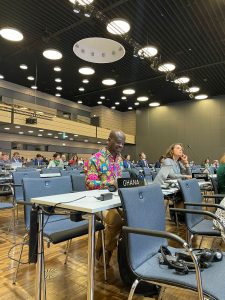58th Session of the UNFCCC Subsidiary Bodies
Ghana CVF Presidency Statement for the Opening Plenary
 Statement Delivered by Dr. Antwi Boasiako Amoah, Acting Director, Climate Vulnerabilities and Adaptation, Environmental Protection Agency (EPA) at the Opening Plenary of the 58th Session of the UNFCCC Subsidiary Bodies
Statement Delivered by Dr. Antwi Boasiako Amoah, Acting Director, Climate Vulnerabilities and Adaptation, Environmental Protection Agency (EPA) at the Opening Plenary of the 58th Session of the UNFCCC Subsidiary Bodies
Bonn, Monday, 5 June 2023
Thank you, chair: I speak for Ghana, which is holding the Presidency of the Climate Vulnerable Forum, the “CVF”.
We are 1.5 billion people worldwide from 58 nations across Africa, Asia, the Caribbean, Latin America, the Middle East, and the Pacific. Thank you for the opportunity to share our expectations for this session.
Excellencies, in this year of the Global Stocktake, we want to focus on mobilizing major polluting nations to “course-correct” to the implementation of their climate commitments to safeguard the 1.5 degrees survival limit. Countries must show ambition in addressing climate change, especially the wealthier countries and major economies who have a particular responsibility to do their fair share and must increase support for climate change action.
At COP27 in Sharm El Sheikh, the international community took a critical step forward by agreeing to establish funding arrangements for loss and damage, including a dedicated fund. While this represents a historic breakthrough in climate negotiations, countries must figure out the details of what these funding arrangements, as well as the new fund, will look like in practice. We want a “no empty bank account” on the loss and damage fund with concrete financial pledges to capitalize the new fund by COP28. The fund must be responsive, adequate, and work towards operating at a scale that corresponds to the needs of the most vulnerable nations.
The recent CVF Traffic Light Assessment launched at COP27 shows that major emitters – the G7 and G20 – should be doing more of their fair-share in their NDC targets. The shortfall of global ambition to safeguard the 1.5oC limit enshrined in the temperature goal of the Paris Agreement should be made up on the basis of equity. 1.5°C is a survival limit for the most vulnerable – some CVF members stand to lose substantial or virtually all their national territory above this level of warming.
Major emitting nations must enhance their ambition in 2023 and do their utmost fair-share effort to reduce emissions during this critical decade by reviewing and strengthening their 2030 NDC.
The principle of equity needs to apply to their adequacy and strength towards the safeguard of the 1.5°C limit.
The CVF will also be launching a new campaign on equity to urge countries to update their NDCs, particularly the wealthy and highly polluting nations, and also to push for finance delivery. We aim to advocate on this through to 2024 in order to promote increased dialogue and understanding of equity considerations in climate action ambition.
Concerning finance, we want to see urgent progress on the $100 billion Delivery Plan to developing countries. The full implementation of the COP26-agreed Delivery Plan is essential to maintaining confidence in the Paris regime, to unlocking climate action potential and for protecting vulnerable communities.
Access to climate finance should be streamlined and facilitated particularly for vulnerable developing countries. Delivery of climate finance in the New Collective Quantified Goal on Climate Finance (NCQC) should be needs-based on the latest available science and in terms of scale and volume, and responsive to the needs of most vulnerable developing countries.
For the Global Goal on Adaptation, COP28 needs to create the building blocks for it to be fully operationalised at the global level. Adaptation is an overriding priority for the most vulnerable nations and the GGA is a central backbone of the Paris Agreement. CVF countries are not only striving to survive but also to thrive. We need not to target the bare minimum but aim to be transformational and move from vulnerability through resilience to prosperity. The GGA needs to catalyze effective support in terms of capacity building, finance and technology.
Other CVF key priorities include the Climate Prosperity Plans. CVF nations are pursuing climate prosperity plans precisely to ensure our national development will be propelled by climate-smart strategies and we hope to present a number of these at COP28. Ghana, Sri Lanka, Bangladesh are the first.
The collaborative engagement of multilaterals and donors behind these plans is an opportunity to support our national ambition in areas such as climate adaptation, addressing loss and damage, as well as renewable energy, while strengthening our partnerships.
Ghana, as Chair of the CVF, will continuously strive to advocate for the necessary action to safeguard those most vulnerable and least responsible for the climate emergency.
We look forward to working with you all to support the strongest possible COP28 outcomes.
I thank you.
